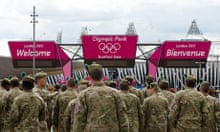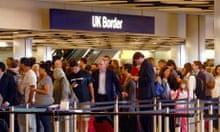G4S will face financial penalties after the military was forced to provide up to 3,500 troops following the private security firm's failure to deliver the promised number of staff for the London Olympic Games, the government has warned.
Ministers were forced into the last-ditch move only a fortnight before the Games are due to begin because they were concerned G4S could not guarantee it would be able to supply the 13,700 guards it was contracted to deliver.
One Whitehall insider accused the Home Office of "sticking its head in the sand" over the need to deploy extra military personnel.
"This has been an accident waiting to happen. The Home Office has waited to make a decision on this because G4S has been saying it is all in hand. But we've run out of time."
The home secretary, Theresa May, has been pressing G4S to provide assurances over its commitments, but patience in Whitehall ran out last weekend and talks began over whether the Ministry of Defence could fill the gap.
"The army will provide an insurance policy," a Whitehall source said.
The news was met with disbelief. Diana Johnson, the shadow home office minister, tweeted: "This is the same G4S who aspire to win policing services through privatisation. Not reassuring."
James Brokenshire, the minister responsible for security, said the problem arose about a fortnight ago and claimed G4S had done "the responsible thing" by admitting in the last 24 hours that there was a problem.
Asked whether G4S would face financial penalties, Brokenshire said: "Part of that budget [for security] is for the payment to guards for the delivery of that service, and therefore that will mean that there will be less paid in respect of guards that will clearly not be delivered."
Brokenshire told the BBC Radio 4 Today programme the government had been "monitoring progress, challenging them [G4S], asking the questions, really going down and kicking the tyres and all those things, and they have been very robust about the fact that they would deliver on the contract. It's only been in these last few weeks that these issues have emerged."
G4S said on Thursday it accepted the government's decision to provide back-up security.
"This has been an unprecedented and very complex security recruitment, training and deployment exercise which has been carried out to a tight timescale," it said in a statement. "We have encountered some issues in relation to workforce supply and scheduling over the last couple of weeks, but are resolving these every day and remain committed to providing a security workforce for the start of the London 2012 Games."
Labour said it was seeking an urgent Commons statement on the situation from the government.
Keith Vaz, the chairman of the home affairs select committee, also said he had asked the G4S chief executive, Nick Buckles, and chairman, Alf Duch-Pedersen, to explain the issue.
"I have written to G4S to inform them that the committee expects to see them next week," Vaz said.
"Considering the assurances we have been given in the past this is very serious and we expect a full explanation from a company that not only have the Olympic contract, but receive hundreds of millions of pounds from the Home Office and other government departments each year."
Tessa Jowell, the shadow Olympics minister, said the security contracts awarded to G4S under the Labour government should have been closely monitored "day by day" to ensure what the company was saying was borne out in fact. But she said the immediate priority was ensuring the safety of Olympic venues.
She told ITV's Daybreak: "We can spend much more time after the Games are over interrogating all the circumstances that led to this.
"Now we've just got to act to make sure that we create a solution. It's absolutely clear – and it should be clear – that if G4S have failed to deliver their contractual obligations they are paid less.
"I would hope that that money, saved from G4S, will be spent on making sure that there are sufficient army personnel so that the people of this country and around the world coming to the Games know they are going to be safe."
She added: "The line of command that led to this failure has got to be understood but I think that today – 15 days away from the opening ceremony – we've just got to focus on putting this big problem right."
The armed forces are already providing up to 13,500 personnel for the Games – split between the venues and back-up for police. Under the contingency plans, this could reach 16,500 – 7,000 more than are deployed in Afghanistan.
The MoD has been seeking guarantees that any soldiers drafted in at the last moment will be properly compensated for cancelled leave.
A defence source said the army units that may be required had been identified and put on a state of shortened readiness. They would be deployed incrementally, as needed, and logistical and training hubs were already being set up to co-ordinate them.
"This is not about the security of the Olympics being in peril," said the source. "Nobody would let that happen. The military has been asked to help, so of course the military will help. I think the general public will be relieved to see members of the British armed forces at the venues providing security. Quite a lot needs to be done, this is a big issue for us, but we can do it."
Colonel Richard Kemp, a former commander of British forces in Afghanistan, said the drafting in of troops to work on security at an event the country had been planning for seven years was "very bizarre".
He told BBC Radio 4's Today programme that many of the 3,500 soldiers would have either just returned from Afghanistan or be about to be deploy there: "So they are people who I imagine are getting ready to go on leave with their families, a well-deserved leave perhaps after six months away on operations or training for future operations, and this will hit them very hard indeed.".
He said that although he had no doubt soldiers would do the job "extremely professionally and with a smile on their face", many of them would be under great pressure because they would have been told in the past few days they were being made redundant.
"The wider morale in the armed forces now is very fragile and this will simply add to that fragility."






Comments (…)
Sign in or create your Guardian account to join the discussion